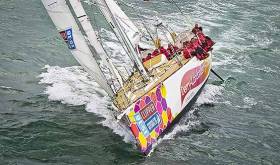Displaying items by tag: Derry–Londonderry–Doire
Clipper Yacht Derry–Londonderry–Doire Wins Qingdao Cup
Derry~Londonderry~Doire has recorded an impressive back to back, clean sweep win in the Clipper 2015-16 Race after taking line honours in The Sailing City • Qingdao Cup following twelve days of racing from Vietnam to China. Once again, as with Race 7, the Northern Irish entry has been closely followed by Garmin in second place.
After eight races this is only the second time a team has recorded a consecutive victory in this tenth edition Clipper Race. Skipper Daniel Smith and his team took a maximum 17 points for being first across the line at 1425 local time (0625 UTC), first through the Scoring Gate and for recording the fastest time in the Ocean Sprint. The points haul means that Derry~Londonderry~Doire will also move up to second place in the Overall Race Standings, overtaking GREAT Britain but still trailing leader LMAX Exchange. Garmin also managed to collect two bonus points at the Scoring Gate so finishes Race 8 with a total of 13 points.
The Sailing City • Qingdao Cup promised to be a rough ride in tough upwind conditions and the final days in particular the East China Sea lived up to the billing, as the fleet was hit by a stronger than forecasted storm which brought violent wind gusts of 80 knots.
Summing up the race in his daily blog just ahead of crossing the finish line, Skipper Daniel reports: “Throughout this race the crew has done a fantastic job, pushing themselves and the boat to its limit and rarely complaining despite horrendous weather. They really deserve a good result and the points they have earned at the Scoring Gate and the Ocean Sprint. They have now proved they can sail upwind (which we struggled with) as well as downwind and that they can keep pushing when the going gets tough,” he continued.
“Garmin has been pushing us hard and several times has been gaining on us and eating away the mileage. This has been a tough race.”
Garmin crossed the finish line almost one hour later at 0717 UTC. Skipper Ash also talked about the competition between his team and Derry~Londonderry~Doire with less than five nautical miles between them as they approached the end of the 1700nM race.
“It has been a really tight contest with them, ever since we ran out of luck and hit a wind hole towards the end of the Ocean Sprint. They have definitely had the better of us in the light airs that we have experienced a lot of recently. Congratulations to Skipper Dan and his team for another excellent win.”
Ash goes on to describe how testing the conditions have been: “This race has been challenging in pretty much every way I can think of. It has had everything from thick fog, traffic and fishing fleets, many miles of beating to windward, slamming, severe storms and even flotsam slowing us down! Throw in the close racing and a podium finish and it all makes for a race that none of us are going to forget in a hurry.
“So, after an eventful race, it's great to be in Qingdao and we are all looking forward to a spectacular welcome that we are told to expect when we cruise in there tomorrow morning.”
An almighty welcome awaits all the teams in Qingdao, the Clipper Race’s longest standing Team Sponsor and Host Port, where the organisers pull out all the stops and the media flocks to greet the crew.
At 0900 local time (0100 UTC) on Friday 11 March Derry~Londonderry~Doire will arrive into Qingdao, followed by Garmin at 1000 local time. The yachts will pass the Olympic Rings en route into the city, which hosted the sailing events in the Beijing Games 2008, where a fanfare of fireworks and Chinese traditional drummers will be on the pontoon to mark their arrival. The Welcome Ceremonies will follow at hourly intervals for all the teams that have crossed the line and motored into Qingdao.
Current Overall Race leader LMAX Exchange is 30nM from the finish line at 1000UTC and expected to take third place on the podium because it holds a 54nM lead over Mission Performance in fourth place.
The Sailing City • Qingdao Cup finish brings the Asia Pacific Challenge to a close, the fifth of eight legs in this 40,000 nautical mile circumnavigation. Throughout the leg, the teams faced all sorts of weather conditions from the Solomon Sea Doldrums after leaving The Whitsundays in Eastern Australia to the Force 11 gales in the Yellow Sea a few days ago.
The next challenge in this round the world race is the Pacific Ocean crossing, the longest of any single race in the Clipper 2015-16 Race. The 6000+ nautical mile voyage takes the fleet to one of the most remote places on the planet, where over 2000nM from land in all directions their nearest neighbour could be the International Space Station.
This is the sixth time the Clipper Race has visited China’s sailing city, Qingdao from where the yachts will set sail for first time Host Port Seattle, USA when Race 9 gets underway on Sunday 20 March.





























































